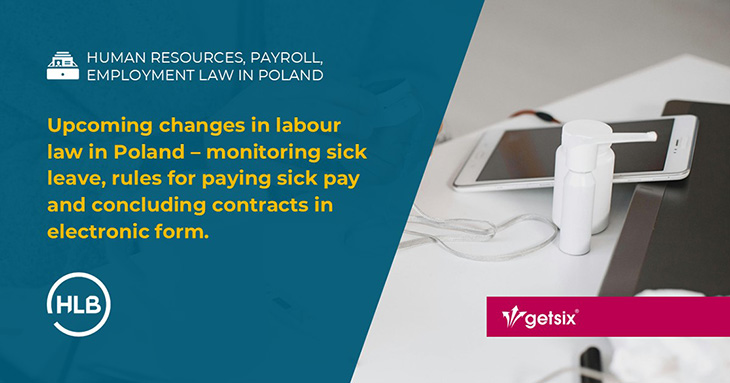Upcoming changes in labour law in Poland – monitoring sick leave, rules for paying sick pay and concluding contracts in electronic form
In this article:
The Social Insurance Institution (ZUS) will gain new powers to monitor sick leave
The Ministry of Family, Labour and Social Policy has prepared a draft amendment to the Social Insurance System Act and certain other acts, which, among other things, is intended to extend and clarify the rules for the control of sick leave by the Social Insurance Institution. The changes are to come into force on 1 January 2026, with some of the provisions on control taking effect 12 months after the Act is announced.
It will be easier to lose sick pay – changes to Article 17
The draft bill proposes new wording for Article 17 of the Sick Pay Act. According to this, an insured person will lose their right to sick pay for the entire period of sick leave if, during that period, they:
- they perform gainful work (i.e. any activity of a gainful nature, regardless of the legal relationship on which it is based, with the exception of incidental activities which must be undertaken during the period of sick leave due to significant circumstances) or
- they undertake activities incompatible with the purpose of the sick leave (such activities include any activities that hinder or prolong the treatment or convalescence process, excluding normal everyday activities or incidental activities that must be undertaken during the period of sick leave due to significant circumstances).
Control of care leave
The amendment also provides for the control of decisions on temporary incapacity for work due to illness and the issuance of medical certificates, as well as decisions on the need for the insured person to personally care for a sick family member.
A new feature will be the possibility to verify whether there is another person in the household who could provide care, unless it concerns a sick child under 2 years of age. According to the proposed regulations, the Social Insurance Institution (ZUS) will be able to:
- refer the insured person for examination by a Social Insurance Institution medical examiner or a consultant doctor referred to in Article 68(2) of the Act of 13 October 1998 on the social insurance system, at a designated location or at their place of residence;
- refer the insured person for additional examinations;
- request the issuer of the medical certificate or the healthcare provider where the medical certificate was issued to provide access to the medical records of the insured person or sick family member, which form the basis for issuing the medical certificate, or to provide explanations and information on the matter;
- request explanations and information on the matter from the insured person.
Furthermore, ZUS inspectors will be authorised to check the identity of the person being inspected, but only for the purpose of confirming their identity.
The Social Insurance Institution (ZUS) and employers will gain the ability to inspect a greater number of cases
The proposed amendments to Article 68 of the Social Insurance System Act provide that:
- ZUS will also be able to inspect persons after their sickness insurance coverage has expired;
- contribution payers (i.e. employers employing more than 20 insured persons) will gain the right to inspect insured persons to whom they pay benefits;
- inspections of the correct use of sick leave by insured persons will be carried out by ZUS, at the request of contribution payers or ex officio.
- Inspections will also apply to persons in quarantine or isolation, including those unable to work for sanitary and epidemiological reasons.
New rules for conducting inspections
The draft also introduces provisions regulating the manner in which inspections are conducted. The key principles are:
- Purposefulness and proportionality: Inspections should be proportionate to their purpose and conducted with respect for privacy and in a manner that does not risk worsening the health of the person being inspected or disrupting the treatment or recovery process.
- Flexibility: Inspections will be carried out as needed, without fixed deadlines, with the possibility of intensification during periods of increased absenteeism.
- Inspection locations: Inspections may take place at the place of residence, work, business or any other place related to the purpose of the inspection.
- Obligations of those being inspected: Persons subject to inspection will be required to provide information and explanations, as well as to allow the inspection to be carried out.
New regulations concerning employment contracts – what will the draft bill on the teleinformatics system bring?
The Ministry of Family, Labour and Social Policy has published a draft bill aimed at thoroughly modernising and expanding the functionality of the ICT system supporting the process of concluding contracts, including, in particular, employment contracts. The proposed changes are intended to enable the widespread, simplified and fully digital conclusion and handling of employment contracts using electronic signatures.
Expanding the group of system users
Until now, the system has been used as a tool for handling simple contracts concluded in everyday life and, therefore, could only be used by natural persons, micro-entrepreneurs, farmers and entities employing up to 9 employees. The project aims to remove this restriction – all interested employers will be able to use the electronic form of concluding contracts, regardless of the size of their workforce or the legal form of their business.
One of the key changes is the expansion of the catalogue of acceptable electronic signatures. In addition to qualified electronic signatures, employment contracts may also be signed using trusted signatures and personal signatures. This paves the way for the widespread use of remote forms of employment without the need to incur the costs associated with obtaining a qualified certificate.
Expansion of the scope of documentation
The project also provides for an expansion of the scope of documentation that can be attached and stored in the system. This includes, among other things, health and safety documentation (e.g. training certificates, statements of familiarisation with occupational risk assessments), as well as documents created outside the system but related to employment.
Importantly, the system will also enable electronic recording of working time, including confirmation of employee attendance. Furthermore, the system is to be integrated with the Social Insurance Institution (ZUS) and other public registers in order to simplify procedures, automatically obtain data necessary for settlements and reduce the documentation obligations on the part of the employer.
Legislative work schedule
The draft is expected to be adopted by the Council of Ministers in the II/III quarter of 2025. We will monitor the legislative process and keep you informed about upcoming changes.
New rules for the payment of compensation for unused holiday leave upon termination of employment
The Ministry of Family and Social Policy has prepared a draft amendment to the Labour Code, which introduces important changes regarding the payment of compensation for unused holiday leave upon termination of employment. The new regulations aim to clarify existing ambiguities and streamline the settlement process between employers and employees.
New rules for determining the payment date
Currently, there is no clear rule that would indicate the date of payment of the equivalent, which often causes interpretation problems. According to the draft, it should be paid on the date of payment of remuneration applicable at a given employer. If, however, this date falls before the date of termination of employment, the equivalent must be paid no later than within ten days from the date of termination of employment. The new solution aims to align the regulations with the functioning of work establishments and to guarantee that employees receive their due benefits on time.
No more interpretation doubts
The introduction of a clear deadline for payment of the equivalent is a response to previous interpretation problems resulting from a lack of precision in the regulations in force. Practice has shown that ambiguities in this area have led to numerous doubts and disputes. Particularly difficult were situations in which remuneration for work was paid before the date of termination of the contract, which caused uncertainty as to the date of payment of the equivalent and generated the risk of claims from employees.
The proposed amendment requires employers to make appropriate organisational preparations. In particular, it will be necessary to analyse the applicable deadlines for the payment of remuneration and equivalent payments, update internal regulations and procedures, and train HR and payroll staff. It is also crucial to ensure adequate internal communication with employees so that the new rules are clear and understandable to them.
 Source: The article was created in collaboration with our cooperation partner – sdzlegal Schindhelm Law Office
Source: The article was created in collaboration with our cooperation partner – sdzlegal Schindhelm Law Office
If you have any questions regarding this topic or if you are in need for any additional information – please do not hesitate to contact us:
HR & PAYROLL DEPARTMENT

BARBARA
ROZWADOWSKA
Head of HR & Payroll Department
Department / Senior Manager
getsix® Group
***














